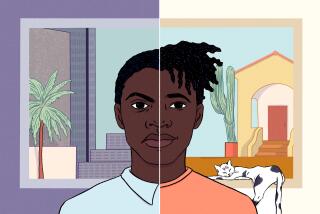The Internet ‘Can Only Encourage Further Isolation’
- Share via
As I was coasting comfortably along the information superhighway the other day, I was sidetracked by a phone call from a friend. She told me a story involving the 4-year-old daughter of a friend of hers. Awaiting a doctor’s appointment, the girl wanted to know if the doctor was “dark” because “dark people” were “scary.” The child’s mother was appalled; had she somehow communicated this racist stereotype to her daughter? Or maybe the child had picked it up from television?
As I logged off, a thought started to come together. While racist assumptions are arguably deep and institutionalized, there may also be simpler culprits; limited experience with people outside of one’s own ethnic group and faulty reasoning. They go together like this: I’ve only seen one or two black people (limited experience), and they scared me; if this doctor is black, she will also scare me (faulty reasoning).
Faulty reasoning is normal in children and changes over time as the child’s capacity to think develops. Limited experience, however, needs to be combated. If we get to know more people of other ethnic groups, we would be forced to make finer discriminations about them than those based merely on gross physical characteristics such as skin color or eye shape. Racist undertones aside, the idea that “all Asians look alike,” for example, is a lumping of people based on the most superficial scanning of their physical features.
What is frightening, however, is that chances for getting to know people different from ourselves may be diminishing. How can this be? After all, we are now citizens of the “global village,” where our packages can be delivered to the remotest corners of the world in a day, guaranteed, and we’re all linked up through long distance lines, faxes and the Internet. But take a look around: people in cities are putting gates around their “communities,” ordering takeout and retiring home to their VCR’s, using the computer to shop, “chat” with people and take classes. Is it possible that we are getting closer and farther apart at the same time? The computer allows me to e-mail friends who otherwise would have been cut adrift, for which I’m thankful, and also to have “conversations” with people I’ve never met, which makes me uneasy. Whenever I avail myself of this pseudo social interaction, I suspect it’s because I’m too lazy and uncreative to go out and find the real thing. (Web site designers know the real thing is better. too. Why do you think they call their sites “cafes” and typing on the keyboard “chatting”?) The technology only reinforces the barriers in my life that prevent me from meeting and interacting with people--people with whom I can have a real cup of spillable coffee.
Of course, the communications technology has opened up the world to some people and connected them in profound ways; for example, the disabled person who is able to communicate much more easily with others. But it can also end up being an instrument of fear. The more we fear venturing outside of our social and geographical comfort zones, the more we rely on technology to get what we need and desire; we can just dial up. And the more technology allows us to do that, the narrower our comfort zones become. None of us knows how this trend will ultimately affect the quality of human relationships, but one potential danger is its impact on race relations in our still-racist society. We already live in segmented neighborhoods that have distinct social boundaries and the new technology can only encourage further isolation. Even if we meet people of different races through the Internet, there is something missing in not being able to see and hear the whole person, with his or her particular skin hue, eye color an shape, speech patterns and mannerisms, all of which enrich and complete the experience.
A few days after my friend’s phone call, I read that Bill Gates, the chairman of Microsoft, had endowed a new computer science building on the Stanford campus. Noting the apparent irony of a physical facility in this age of low-cost remote communication, Gates said he felt that technological advances still depended on people getting together face-to-face. I think I will walk over to my friend’s house and tell her about it.






